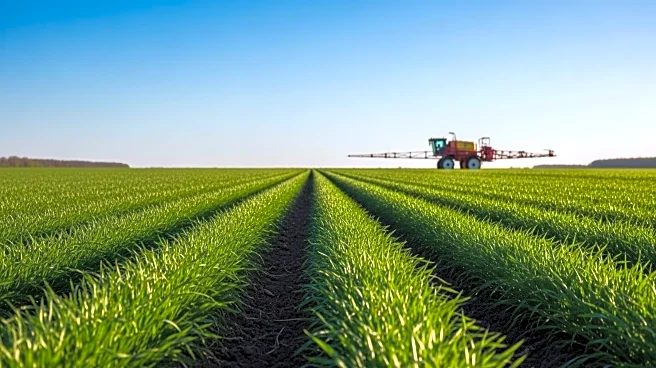What's Happening?
The agrochemicals market is experiencing significant growth driven by the rising need for sustainable agriculture. According to IMARC Group, the global agrochemicals market was valued at USD 297.7 billion in 2024 and is projected to reach USD 394.8 billion by 2033, with a CAGR of 3.2%. The demand for enhanced agricultural productivity due to increasing global population is pushing farmers to use advanced fertilizers, pesticides, and herbicides. Additionally, the adoption of bio-based and sustainable agrochemicals is increasing as environmental concerns and regulatory pressures mount. Technological advancements in agrochemical formulations, such as nanotechnology and precision delivery systems, are improving application accuracy and minimizing chemical waste.
Why It's Important?
The shift towards sustainable and bio-based agrochemicals is crucial for addressing environmental concerns and ensuring food security. As traditional arable land becomes scarcer, maximizing output per hectare is essential. The adoption of precision farming methods and integrated pest management systems enhances the effective use of agrochemicals, contributing to soil fertility and crop quality. The trend towards organic and non-risky foods is driving the demand for bio-pesticides and bio-fertilizers, which reduce soil and water pollution. This transformation in the agrochemicals market aligns with global efforts to promote resilient food production systems and sustainable agriculture practices.
What's Next?
The agrochemicals market is expected to undergo major transformations in 2025, driven by sustainability, innovation, and consumer preferences. Companies are focusing on precision-based agrochemicals that require minimal usage and have a reduced environmental impact. The integration of agri-tech and chemical businesses is anticipated to create custom solutions for varied soil and crop types, fostering a more adaptive, data-driven, and sustainability-focused industry. As regulations on chemical pesticide use tighten, innovations in sustainable agriculture inputs will continue to emerge, further shaping the market's expansion path.
Beyond the Headlines
The agrochemicals industry's shift towards sustainable practices has ethical and environmental implications. The move from synthetic to biologically derived products aims to protect ecosystems and human health. The collaboration between agricultural research institutions and the private sector is crucial for developing efficient bio-based solutions. This transition not only supports environmental sustainability but also aligns with consumer demand for organic and safe food products, highlighting the industry's role in promoting global food security and environmental stewardship.









